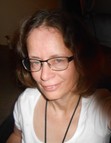Does “Read A Lot” Help You Improve as a Writer?
 Cute business cat wearing glasses reading notebook (book)
Cute business cat wearing glasses reading notebook (book)Image © vvvita / Deposit Photos (I’m writing a story with a Siamese cat in it.)
This post is inspired by a StoryGrid video on YouTube. I thought it was interesting advice to question because it is recommended everywhere. If there’s a top ten list of writing advice, this will be on it. Many best-selling writers recommend reading everything.
But is it true?
Like anything in fiction, it gets a “Well, maybe…”
Probably the reason it gets recommended is because there are people who have a skewed view of writing. They hate their day job and envision writing a best seller as a way to “win the lottery.” After all, how hard can it be?
And they decide to write a novel…but don’t read much fiction. Or with a writer I knew, working endlessly on a novel, didn’t read anything at all. He was decent enough with the words, but absolutely no concept of story. He always claimed he didn’t have time to read. Always made me wonder how he had time to write.
You need an inkling of what story is going into a novel.
You also need to know what current in the genre you’re writing in. Another writer complained that nothing she wrote was selling, so she was thinking of trying a “bodice ripper.” That told me right away she hadn’t read romance since the 1980s. And she wanted to write one that would sell?!
Then there’s the third type. That writer sneers as best sellers as being “for the masses,” and therefore assumes they’re all terrible (sight unseen). They might think they can write a book like a master from forty years ago or even a century. It’s elite thinking, and lands solidly in not knowing what today’s reader wants.
So reading fiction is important.
But simply reading a lot of books is probably not going to teach you anything, especially at first. Most writers start critiquing published books as a result. This is a terrible way to learn!
You end up viewing books negatively, thinking no one is writing anything good anymore. Because every book is flawed. It’s part of the creativity! If it were perfectly written, following every proper grammar rule exactly, it’d be boring!
The problem is that you need some skills under your belt to understand what you’re looking for.
We have Renoirs and Monets at the National Art Gallery, including my favorite, A Girl with a Watering Can. Artists set up easels and paint what they see to learn from the masters.
But if I were to set up an easel and try to paint Renoir, I wouldn’t be able to learn anything at all. Why? I don’t know anything at all about painting. I’d sit down at that easel and make a mess of it that looked nothing like Renoir.
That’s where reading lots of books won’t help if you don’t know how to use it. Which results in critiquing sentences—complete waste of time when there are so many better things to learn.
So you have to do a combination of writing, even if you think it’s awful or you don’t know what you’re doing, and learning.
The learning is tricky. Everything’s for beginners, and it actually may not be the best thing to learn. Plot is easy to teach, works with an outline, so it’s a common skill. Yet, it’s such a big, complex topic that it’s not something black and white you could learn simply from reading a book. You might not be able to learn it by returning to the book and trying to identify the plot (especially as ill-defined as it usually is).
Plus, it’s so big that it’ll be overwhelming. I’ve done an analysis of story structure (another way big thing); it takes a lot of time and effort. Plus, like the Renoir, you have to know what to look for.
Better might be to start with small skills. The first step is to read the entire book first. Just enjoy it. They try something like:
In a mystery, after you’ve read it, picking out all the places the killer appears. You might discover he inserts himself into the investigation, which is a pretty cool discovery.Metaphor usage. I did this as a week long challenge and was amazed at how many phrases and words we use that a metaphors.Identify the sentences showing the main character’s emotions.In a fantasy, track one element of the world building that you like. You could try typing paragraphs of the word building, for example (like the artist painting Monet).Key is to keep the skill small and manageable. It’s awfully easy to think that you have to do ten things, then you get overwhelmed and do none of them.
Any other small things you’d recommend?



